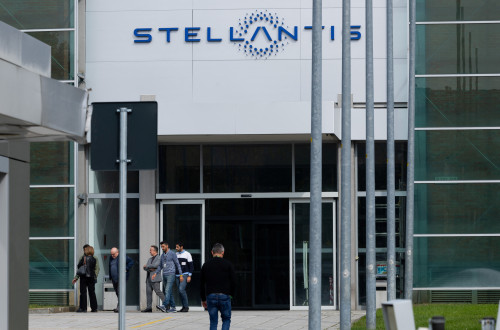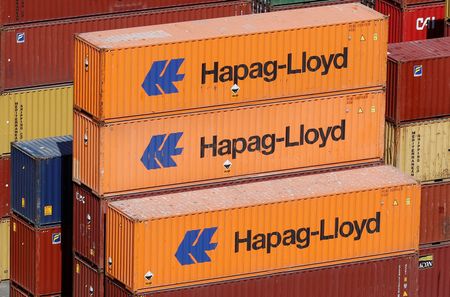 1
1 1
1
By Vera Eckert
FRANKFURT (Reuters) -German container shipper Hapag-Lloyd on Thursday posted net profit of 2.9 billion euros ($3.18 billion) for the first half of 2023, down by 67% from a year earlier, but maintained its full year earnings forecast.
The net profit compared with 8.7 billion euros in 2022 when shipping, a proxy for global trade, enjoyed a boom as economic growth rebounded following the end of pandemic lockdowns and as logistics disruptions raised freight rates for customers.
Rates have since fallen as logjams have eased and the economy is slowing. Cheaper freight has also hit the results of Hapag-Lloyd’s rivals Maersk and CMA CGM.
Chief Executive Rolf Habben Jansen said there were signs of recovery in spot freight rates and loadings.
“If you look at the last 10 or 12 weeks and how much volume we load, then we are slightly above year-ago,” he told Reuters.
Shares in Hapag-Lloyd, the world’s fifth-largest shipping line, were 2.9% down at 187.5 euros in early trade.
Its first half revenues were 41% lower at 10.0 billion euros.
Transport volumes fell 3.4% to 5.8 million 20-foot equivalent units (TEU) year-on-year, as demand for transport fell on the Asian and European trade routes to North America, and freight rates were down 38% at $1,761 per TEU.
Lower costs provided some relief. In the first half, tanker fuel prices fell by 11% to $625 per tonne. Oil prices have since begun to rise on international markets, supported by producer output cuts.
Hapag-Lloyd upheld its May guidance – in turn a repetition of March guidance – for its 2023 full-year earnings before interest and taxes (EBIT) to be in a 2-4 billion euros range.
EBITDA is expected to be between 4 billion and 6 billion euros.
However, the war in Ukraine, geopolitical uncertainties, persistent inflationary pressures and high inventory levels are creating risks that could negatively impact the forecast, Hapag-Lloyd said.
($1 = 0.9107 euros)
(Reporting by Vera Eckert, editing by Friederike Heine, Kim Coghill and Barbara Lewis)